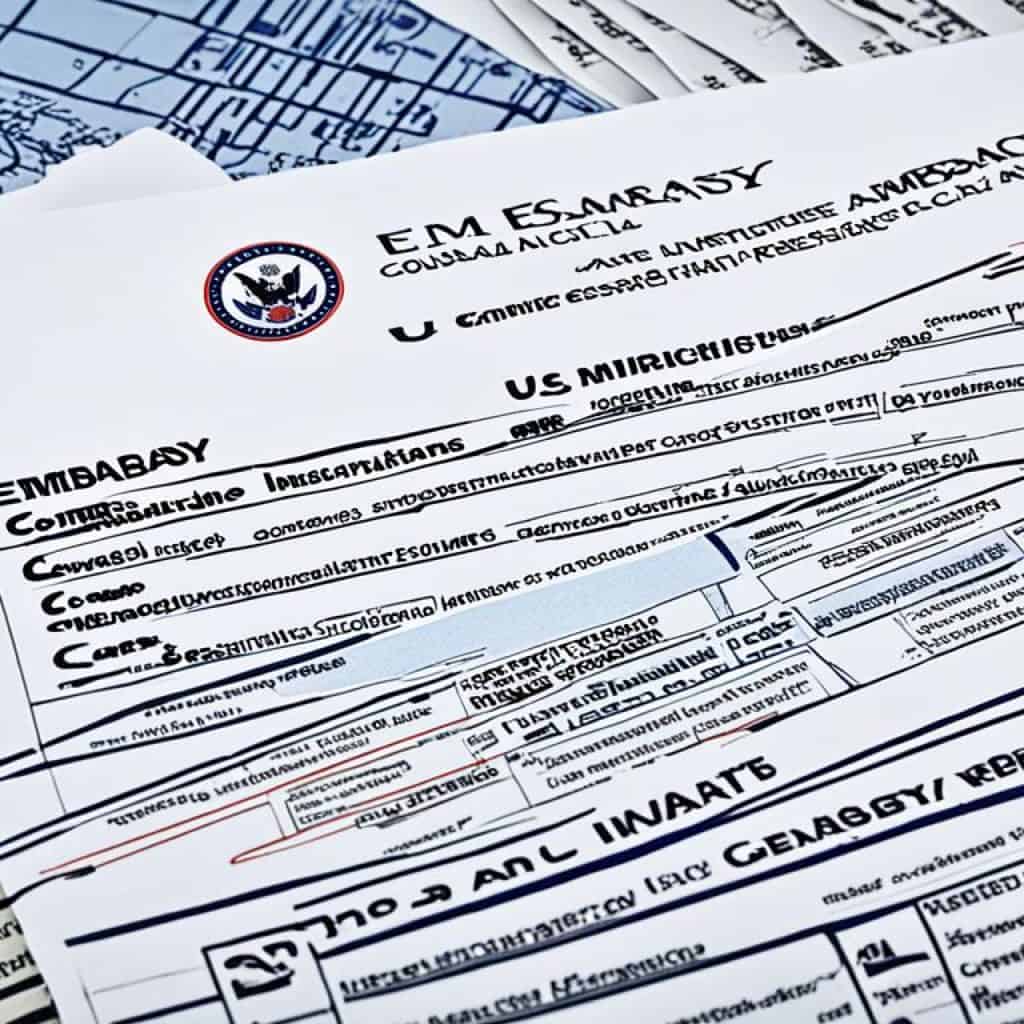Are you eagerly anticipating your dream wedding in the United States? The K-1 visa, also known as a fiancé visa, could be the key to making your dreams a reality. But do you know what it takes to navigate the K-1 visa process successfully? From understanding the requirements to preparing for the visa interview, there’s a lot to consider.
In this comprehensive guide, we’ll walk you through every step of the K-1 visa journey, providing you with the knowledge and tools you need to ensure a smooth process. Whether you’re wondering about the timeline, the cost, or the necessary documentation, we’ve got you covered.
So, are you ready to embark on this exciting journey towards marriage-based entry into the US? Let’s dive in!
Key Takeaways:
- Understand the requirements and timeline of the K-1 visa process.
- Prepare the necessary documentation for the visa application.
- Know what to expect during the visa interview.
- Be aware of the financial costs associated with the K-1 visa.
- Discover the rights and protections available to K-1 visa holders.
Overview: What Is a K-1 Visa?
A K-1 visa is a nonimmigrant visa that allows the foreign-citizen fiancé(e) of a U.S. citizen to enter the United States for the purpose of getting married. The visa is valid for 90 days, during which the couple must marry. After the marriage, the foreign-citizen fiancé(e) can apply for adjustment of status to become a permanent resident.
| Requirements | Process | Timeline |
|---|---|---|
| An approved Petition for Alien Fiancé(e) from a U.S. citizen sponsor. | File Form I-129F, Petition for Alien Fiancé(e), with USCIS. | Varies depending on USCIS processing times. |
| Evidence of a bona fide relationship and intention to marry. | Once approved, the petition is sent to the NVC and then the U.S. embassy or consulate. | Varies depending on embassy or consulate processing times. |
| No criminal record and passing a medical examination. | Complete Form DS-160, the online nonimmigrant visa application, and schedule a visa interview. | Varies depending on embassy or consulate scheduling availability. |
| Proof of financial support and ability to financially support the fiancé(e) in the U.S. | Provide the required documentation and attend the visa interview. | Varies depending on embassy or consulate processing times. |
Key Points:
- A K-1 visa allows foreign-citizen fiancé(e)s to enter the U.S. for marriage purposes.
- The visa is valid for 90 days, during which the couple must marry.
- After marriage, the fiancé(e) can apply for adjustment of status to become a permanent resident.
“The K-1 visa provides a unique opportunity for engaged couples to be together in the United States and take the next step in their relationship.” – Immigration Attorney Jane Smith
What Is a “Fiancé(e)”?
Under U.S. immigration law, a fiancé(e) is the recipient of an approved Petition for Alien Fiancé(e) and has been issued a nonimmigrant K-1 visa. A fiancé(e) must be legally free to marry and intends to marry their U.S. citizen sponsor within 90 days of arrival in the U.S.
| Criteria | Definition |
|---|---|
| Approved Petition for Alien Fiancé(e) | A formal approval notice from the U.S. Citizenship and Immigration Services (USCIS) confirming the eligibility to apply for a K-1 visa. |
| Nonimmigrant K-1 Visa | A temporary visa granted to a foreign-citizen fiancé(e) for the purpose of entering the U.S. and getting married to their U.S. citizen sponsor. |
| Legally Free to Marry | The fiancé(e) must be legally able to marry and not bound by any prior marriage or engagement that would prevent them from entering into a new marriage. |
| Marriage Intent | The fiancé(e) must have a genuine intent to marry their U.S. citizen sponsor within the 90-day period of their K-1 visa’s validity. |

“A fiancé(e) is someone who has received the approved Petition for Alien Fiancé(e) and has been granted a nonimmigrant K-1 visa. It is an exciting and unique status that allows couples to navigate the immigration process in order to be together and start a life in the United States. However, it is crucial for both parties to understand the legal requirements and responsibilities involved in the fiancé(e) visa process.”
The International Marriage Broker Regulation Act of 2005 (IMBRA)
The International Marriage Broker Regulation Act of 2005 (IMBRA) is a federal law that aims to provide protection to foreign fiancées, especially those who met through international marriage brokers. It requires U.S. citizens who petition for a K-1 visa to disclose certain information about their criminal history and marital history to the U.S. Citizenship and Immigration Services (USCIS).
The First Step: Filing the Petition
The journey towards obtaining a K-1 visa begins with filing the Form I-129F, also known as the Petition for Alien Fiancé(e). This crucial step is initiated by the U.S. citizen sponsor, who must establish a qualifying relationship with their foreign-citizen fiancé(e). To ensure a smooth and efficient process, it is essential to file this petition accurately and in a timely manner.
Form I-129F serves as the foundation of your K-1 visa application. It provides information about your relationship, such as how you met, the length of your relationship, and your intention to marry within 90 days of your fiancé(e)’s arrival in the United States. By filing this petition, you demonstrate your commitment to building a life together and seeking approval for your fiancé(e) to join you in the United States.
The Form I-129F petition is submitted to the U.S. Citizenship and Immigration Services (USCIS). It is crucial to file the petition at the USCIS office that serves the area where the U.S. citizen sponsor resides. Failing to file the petition at the correct USCIS office may result in unnecessary delays and complications.
Once the petition is filed, USCIS will review it to verify the eligibility of both the U.S. citizen sponsor and the foreign-citizen fiancé(e). This review process ensures that all necessary information is provided and that the relationship meets the requirements for a K-1 visa. USCIS may request additional documentation or evidence to support the petition.
This step in the process plays a vital role in setting the foundation for your K-1 visa journey. It is essential to thoroughly complete the Form I-129F, ensuring accuracy and attention to detail. By doing so, you increase your chances of a successful application and pave the way for the next steps in the process.
| Key Points | Considerations |
|---|---|
| Submit Form I-129F to USCIS | File at the USCIS office serving your area |
| Establish a qualifying relationship | Demonstrate intention to marry within 90 days |
| Thoroughly complete the petition | Ensure accuracy and attention to detail |
| Provide supporting documentation | Include evidence of your relationship |
The Second Step: Applying for a Visa
Once the United States Citizenship and Immigration Services (USCIS) approves the petition, the next step is to apply for a K-1 visa. The process is facilitated by the National Visa Center (NVC), which will provide instructions to the foreign-citizen fiancé(e) on how to proceed.
The first requirement is to complete Form DS-160, which is the online nonimmigrant visa application. This form collects important personal information, travel plans, and background details. It’s crucial to fill out the form accurately and honestly to avoid delays or complications in the visa application process.
After submitting Form DS-160, the next step is to schedule a K-1 visa interview at the nearest U.S. embassy or consulate. The purpose of the interview is for the consular officer to assess the eligibility of the foreign-citizen fiancé(e) and ensure that the relationship is genuine and not entered into for the purpose of obtaining immigration benefits.
The interview is an important part of the application process and should be approached with careful preparation. It’s recommended to bring all necessary documentation, such as passports, birth certificates, police certificates, medical examination records, and evidence of financial support, as requested by the specific embassy or consulate.
In the words of the U.S. Department of State, “The DS-160 and visa interview are the second steps in the fiancé(e) visa process. Your fiancé(e) should not make any final travel arrangements, dispose of property, or give up employment until the visa is approved.”
Required Documents for the K-1 Visa Interview
| Document | Description |
|---|---|
| Completed Form DS-160 | A detailed online nonimmigrant visa application form. |
| Valid Passport | A passport with at least six months of validity beyond the intended period of stay in the United States. |
| Birth Certificate | An official document proving the date and place of birth. |
| Police Certificates | Evidence of a clean criminal record from each country where the fiancé(e) has lived for more than six months since the age of 16. |
| Medical Examination Records | Results of the medical examination performed by an authorized panel physician. |
| Evidence of Financial Support | Documentation demonstrating that the U.S. citizen sponsor is capable of financially supporting the foreign-citizen fiancé(e) during their time in the United States. |
| Photographs | Recent, color photographs in the specified format. |
It’s important to note that the consular officer may request additional documents to prove the authenticity of the relationship. Being well-prepared and organized will increase the chances of a successful visa interview and pave the way for the next steps in the K-1 visa process.

Required Documentation
When applying for a K-1 visa, it is essential to prepare all the necessary documentation to ensure a smooth visa interview process. The following documents are typically required:
- Completed Form DS-160: This is the online nonimmigrant visa application form that must be filled out accurately and truthfully.
- Valid Passport: The foreign-citizen fiancé(e) must have a passport that is valid for at least six months beyond the intended entry date into the United States.
- Birth Certificate: A certified copy of the foreign-citizen fiancé(e)’s birth certificate is required to establish identity and date of birth.
- Divorce or Death Certificates: If either the foreign-citizen fiancé(e) or the U.S. citizen sponsor has been previously married, divorce or death certificates must be provided as proof of the legal termination of any previous marriages.
- Police Certificates: A police certificate from every country where the foreign-citizen fiancé(e) has resided for six months or longer since turning 16 is required to establish a good moral character.
- Medical Examination Records: The foreign-citizen fiancé(e) must undergo a medical examination by an authorized panel physician and provide the relevant documentation of the examination results.
- Evidence of Financial Support: Documentation proving that the U.S. citizen sponsor meets the income requirements to support the foreign-citizen fiancé(e) during their stay in the United States is necessary. This can include employment verification, recent tax returns, or bank statements.
- Photographs: Two color photographs of the foreign-citizen fiancé(e) are required, adhering to specific visa photo requirements regarding size, background, and other specifications.
The consular officer conducting the visa interview may also request additional evidence to establish the genuineness of the relationship. It is important to provide all requested documentation and be prepared to answer questions about your relationship and intentions to marry.
Ensuring that you have all the required documentation in order and organized before your visa interview will help streamline the process and increase your chances of a successful K-1 visa application.
Review Additional U.S. Embassy/Consulate-Specific Instructions
When applying for a K-1 visa, it is crucial to familiarize yourself with the specific instructions and requirements from the U.S. embassy or consulate where you will be completing your visa interview. Each embassy or consulate may have unique procedures and documentation requirements.
To ensure a smooth visa interview process, follow these steps:
- Visit the U.S. embassy’s or consulate’s website for your specific location.
- Look for the consulate’s or embassy’s specific instructions for K-1 visa applicants. These will outline any additional documentation or forms that may be required.
- Thoroughly review the instructions to ensure you gather all necessary documents and meet all requirements.
- Don’t leave preparations until the last minute. Start gathering required documents well in advance to avoid any delays or complications.
By reviewing and following the U.S. embassy’s or consulate’s specific instructions, you can ensure that you have all the necessary documentation and are fully prepared for your K-1 visa interview.
Tip: Pay close attention to any deadlines or specific formatting requirements outlined in the instructions. Failure to comply with these instructions could result in delays or even denial of your visa application.
Remember, each U.S. embassy or consulate may have slightly different requirements, so it is important to review the instructions specific to your location. The embassy’s or consulate’s website will be the most reliable source of information.
Embassy/Consulate Instructions Example:
| Embassy/Consulate | Visa Interview Documentation Required | Contact Information |
|---|---|---|
| U.S. Embassy in London, United Kingdom |
|
|
| U.S. Consulate General in São Paulo, Brazil |
|
|
Ensure you carefully review the specific instructions for your U.S. embassy or consulate to avoid any complications or delays in your K-1 visa application process.

Medical Examination and Vaccination Requirements
In order to obtain a K-1 visa, applicants are required to undergo a comprehensive medical examination conducted by an authorized panel physician. This examination serves to ensure that the applicant is in good health and meets the vaccination requirements set forth by the U.S. government.
The medical examination is an important step in the K-1 visa process as it helps to safeguard the health and well-being of both the applicant and the U.S. population. It includes a thorough review of the applicant’s medical history, physical examination, and testing for communicable diseases.
Medical Examination Process
The medical examination must be conducted by a physician who has been designated by the U.S. Embassy or Consulate in the applicant’s home country. The physician will assess the applicant’s overall health, including vital signs, physical condition, and any existing medical conditions.
During the examination, the physician will also review the applicant’s immunization record to ensure compliance with the vaccination requirements. These requirements may vary depending on the applicant’s age, medical history, and country of origin.
Vaccination Requirements
The U.S. government requires certain vaccinations to protect public health. While vaccinations are generally optional for K-1 visa issuance, they become mandatory when the applicant adjusts their status to that of a legal permanent resident.
Common vaccinations that may be required include those for diseases such as measles, mumps, rubella, tetanus, diphtheria, pertussis, hepatitis B, and influenza. The specific vaccines needed will depend on the applicant’s age, medical condition, and vaccination history.
| Vaccination | Required for K-1 Visa Issuance | Required for Adjustment of Status |
|---|---|---|
| Measles, mumps, and rubella (MMR) | No | Yes |
| Tetanus, diphtheria, and pertussis (TDAP) | No | Yes |
| Hepatitis B | No | Yes |
| Influenza | No | Yes |
| Varicella (chickenpox) | No | Yes (for applicants under 14 years old) |
It is important for K-1 visa applicants to follow the instructions provided by the authorized panel physician regarding the medical examination and vaccination requirements. Failure to comply with these requirements may result in delays or denial of the visa application.
“The medical examination and vaccination requirements for the K-1 visa ensure the health and safety of both the applicant and the U.S. population. By completing these necessary steps, applicants can demonstrate their commitment to the immigration process and their willingness to abide by U.S. health regulations.”
Proof of Financial Support and Affidavit of Support Forms
When applying for a K-1 visa, it is crucial to demonstrate proof of financial support. The U.S. citizen sponsor must provide evidence that they can financially support their foreign-citizen fiancé(e) during their stay in the United States. This proof is essential to ensure that the couple will not become a public charge and can meet their financial obligations.
One of the required forms to establish financial support is the Form I-134, Affidavit of Support. The foreign-citizen fiancé(e) may be requested to complete this form during the visa interview. The Form I-134 outlines the sponsor’s financial assets, income, and other relevant information to assure the consular officer of their ability to financially support the fiancé(e).
Additionally, during the adjustment of status process, the U.S. citizen sponsor will need to submit the Form I-864, Affidavit of Support to the U.S. Citizenship and Immigration Services (USCIS). This form provides a legal contract between the sponsor and the U.S. government, affirming their commitment to financially support the foreign-citizen fiancé(e) as they navigate the path to permanent residency.
It’s important to note that the financial support requirement aims to ensure the well-being and stability of the couple as they embark on their married life in the United States. By providing proof of financial support, the U.S. citizen sponsor demonstrates their ability to take care of their fiancé(e) throughout the immigration process.
To strengthen the case for financial support, couples should gather supporting documents such as bank statements, tax returns, employment letters, and any other relevant financial records. These documents serve as tangible evidence of the sponsor’s financial stability and ability to fulfill their obligations.
Remember, the proof of financial support is a crucial aspect of the K-1 visa application process. By completing the required forms and providing supporting documentation, couples can provide the necessary assurance to the U.S. government regarding their financial readiness.
The Role of the Affidavit of Support
The Affidavit of Support, both the Form I-134 and Form I-864, play a vital role in proving financial capability and responsibility. These forms serve as legal commitments from the U.S. citizen sponsor, assuring the government that the fiancé(e) will not become a financial burden on public welfare programs.
| Form | Purpose |
|---|---|
| Form I-134 | Establish financial support during the visa interview |
| Form I-864 | Demonstrate financial support during the adjustment of status process |
Fees – How Much Does a K Visa Cost?
Obtaining a K-1 visa involves various fees that applicants need to consider. These fees are essential for processing and managing the visa application. The total cost of a K-1 visa includes several components:
- Filing fee for Form I-129F: This fee is required to submit the Petition for Alien Fiancé(e) (Form I-129F) to the U.S. Citizenship and Immigration Services (USCIS). The current filing fee for Form I-129F is $535.
- Nonimmigrant visa application processing fee (Form DS-160): After the USCIS approves the petition, the foreign-citizen fiancé(e) needs to apply for the K-1 visa by completing Form DS-160, the online nonimmigrant visa application. The processing fee for Form DS-160 varies by country.
- Medical examination fee: As part of the K-1 visa application process, the foreign-citizen fiancé(e) must undergo a medical examination performed by an authorized panel physician. The fee for the medical examination also varies by country.
- Other miscellaneous costs: In addition to the filing and processing fees, there may be other miscellaneous costs associated with the K-1 visa application. These costs can include translation and photocopying charges for supporting documents.
Please note that the specific fees mentioned above can vary depending on the country and case. It is advisable to check the USCIS website or consult with an immigration attorney for the most accurate information regarding the current fees.
Ensuring that all necessary fees are paid in a timely manner is crucial for the smooth processing of the K-1 visa application. Failure to pay the required fees may result in delays or even denial of the visa. It is important to budget and prepare for these expenses accordingly to avoid any unnecessary complications.
Rights and Protections – Pamphlet
K-1 visa applicants should read the Rights and Protections pamphlet before their visa interview. This pamphlet provides important information about rights and protections related to domestic violence, sexual assault, and child abuse in the United States.
The Rights and Protections pamphlet is designed to ensure that K-1 visa applicants are aware of their legal rights and the resources available to them in the United States. It contains valuable information on how to seek help, report incidents, and access support services in case of any form of abuse or violence.
| Key Topics Covered: | Domestic Violence | Sexual Assault | Child Abuse |
|---|---|---|---|
| Overview | Understanding domestic violence and recognizing the signs | Raising awareness about sexual assault and consent | Identifying child abuse and reporting procedures |
| Legal Rights | Information on restraining orders and legal remedies | Understanding consent laws and sexual assault legislation | Child abuse laws and protection measures |
| Support Services | List of helplines and shelters for victims of domestic violence | Referral to organizations providing medical, legal, and psychological support | Resources for child abuse prevention and intervention |
| Reporting Procedures | Guidance on reporting incidents to law enforcement agencies | Information on reporting sexual assault to authorities | Reporting child abuse to child protective services |
“Everyone should feel safe and protected. We encourage all K-1 visa applicants to familiarize themselves with the Rights and Protections pamphlet. Remember, you have the right to be safe.”
By providing this valuable resource, the Rights and Protections pamphlet ensures that K-1 visa applicants are equipped with the necessary knowledge and tools to protect themselves and seek assistance if needed. It emphasizes the commitment of the United States to uphold the rights and safety of all individuals, including foreign-citizen fiancé(e)s.
After You Receive a K-1 Fiancé(e) Visa
Once you receive your K-1 fiancé(e) visa and arrive in the United States, it’s time to begin a new chapter in your life with your U.S. citizen sponsor. Within 90 days of your arrival, you must get married to your sponsor. This is an exciting time for both of you as you start your journey towards building a life together in the United States.
After your marriage, the next step is to apply for adjustment of status to become a permanent resident. The adjustment of status process allows you to transition from a K-1 visa holder to a lawful permanent resident, granting you the ability to live and work in the United States permanently.
To apply for adjustment of status, you will need to submit Form I-485, Application to Register Permanent Residence or Adjust Status. This form is used to provide information about your background, eligibility for permanent residence, and to assess any grounds of inadmissibility
During the adjustment of status process, you may also be required to attend an interview with a U.S. Citizenship and Immigration Services (USCIS) officer. The purpose of the interview is to verify the information provided in your application and to determine if you meet the requirements for permanent residence.
It’s important to carefully follow the instructions provided by USCIS throughout the adjustment of status process. Be sure to gather and submit all the necessary documentation to support your application, such as proof of marriage, financial support, and any other requested evidence.
Remember, the adjustment of status process is a crucial step towards obtaining permanent residence in the United States. It’s essential to stay organized, keep track of deadlines, and seek legal assistance if needed to ensure a smooth and successful transition to permanent residency.
Adjustment of Status Application Checklist
| Documents | Description |
|---|---|
| Form I-485 | Application to Register Permanent Residence or Adjust Status |
| Proof of Marriage | Marriage certificate or other evidence of marriage |
| Identity and Eligibility | Valid passport, birth certificate, and other identification documents |
| Proof of Financial Support | Form I-864, Affidavit of Support, and supporting financial documents |
| Photos | Passport-style photographs |
| Medical Examination | Completed medical examination performed by an authorized physician |
| Fee Payment | Payment of the required adjustment of status fee |
| Additional Documentation | Any other supporting documents requested by USCIS |
Once your adjustment of status application is submitted, it will be reviewed by USCIS. The processing time can vary, but it’s important to stay patient and keep track of your application status online. Make sure to comply with any additional requests or interviews from USCIS during the process.
Once your adjustment of status is approved, you will receive your lawful permanent resident card, also known as a “green card.” This card provides proof of your permanent resident status and grants you the rights and benefits of a permanent resident in the United States.
With your adjustment of status approved, you can now focus on building a life in the United States with your spouse. It’s an exciting transition, and with the proper documentation and adherence to immigration regulations, you can fully enjoy the benefits of your new legal status.
Conclusion
Obtaining a K-1 visa is the first step in the process of marrying a U.S. citizen and becoming a permanent resident. To ensure a smooth journey, it is crucial to carefully follow the requirements and instructions provided by USCIS and the U.S. embassy or consulate.
Understanding the timeline of the K-1 visa process allows couples to plan accordingly and avoid unnecessary delays. By being aware of the costs involved, such as filing fees and medical examination fees, individuals can financially prepare for the application process.
Additionally, gathering the necessary documentation, such as a completed Form DS-160, proof of financial support, and supporting evidence of the relationship, is essential for a successful visa interview. Paying attention to U.S. embassy or consulate-specific instructions further ensures that all requirements are met.
With a comprehensive understanding of the K-1 visa process, couples can confidently embark on their journey toward a marriage-based entry into the United States, laying the foundation for a future together as permanent residents.
FAQ
What is a K-1 visa?
A K-1 visa is a type of visa that allows the foreign-citizen fiancé(e) of a U.S. citizen to enter the United States for the purpose of marrying their U.S. citizen sponsor within 90 days.
What is a “fiancé(e)”?
In the context of a K-1 visa, a fiancé(e) refers to the recipient of an approved Petition for Alien Fiancé(e) who intends to marry their U.S. citizen sponsor within 90 days of arrival in the U.S.
What is the International Marriage Broker Regulation Act of 2005 (IMBRA)?
The International Marriage Broker Regulation Act of 2005 (IMBRA) is a federal law that requires U.S. citizens petitioning for a K-1 visa to disclose certain information about their criminal history and marital history to the U.S. Citizenship and Immigration Services (USCIS).
What is the first step in the K-1 visa process?
The first step is for the U.S. citizen sponsor to file Form I-129F, Petition for Alien Fiancé(e), with the USCIS to establish a qualifying relationship between the sponsor and the foreign-citizen fiancé(e).
What is the second step in the K-1 visa process?
The second step is for the foreign-citizen fiancé(e) to apply for a K-1 visa by completing Form DS-160, the online nonimmigrant visa application, and scheduling a visa interview at the nearest U.S. embassy or consulate.
What documents are required for the K-1 visa interview?
The required documents include a completed Form DS-160, valid passport, birth certificate, divorce or death certificates (if applicable), police certificates, medical examination records, evidence of financial support, and photographs. Additional evidence of the relationship may be requested by the consular officer.
Are there specific instructions for K-1 visa applicants at each U.S. embassy or consulate?
Yes, each U.S. embassy or consulate may have specific instructions and requirements for K-1 visa applicants. It is important to review these instructions on the embassy’s or consulate’s website and ensure all necessary documentation is brought to the visa interview.
Is a medical examination required for the K-1 visa?
Yes, the foreign-citizen fiancé(e) is required to undergo a medical examination performed by an authorized panel physician to ensure good health and meet vaccination requirements.
What is the financial support requirement for the K-1 visa?
The foreign-citizen fiancé(e) must provide evidence of financial support during the visa interview, including completing Form I-134, Affidavit of Support, which may be requested by the consular officer. The U.S. citizen sponsor will also need to submit Form I-864, Affidavit of Support, to USCIS during the adjustment of status process.
How much does a K-1 visa cost?
The total cost of a K-1 visa includes several fees, such as the filing fee for Form I-129F, the nonimmigrant visa application processing fee (Form DS-160), the medical examination fee, and other miscellaneous costs. The specific fees can vary depending on the country and case.
Is there a pamphlet on rights and protections for K-1 visa applicants?
Yes, K-1 visa applicants should read the Rights and Protections pamphlet before their visa interview. This pamphlet provides important information about rights and protections related to domestic violence, sexual assault, and child abuse in the United States.
What happens after I receive the K-1 visa and arrive in the United States?
Once you receive the K-1 visa and arrive in the United States, you have 90 days to get married to your U.S. citizen sponsor. After the marriage, you can apply for adjustment of status to become a permanent resident by submitting Form I-485, Application to Register Permanent Residence or Adjust Status.








Add comment